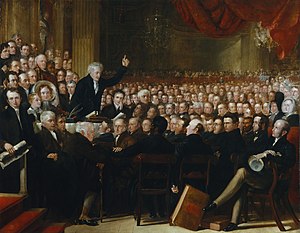George Bradburn
George Bradburn (March 4, 1806 – July 26, 1880) was an American politician and Unitarian minister in Massachusetts known for his support for abolitionism and women's rights.
This was not without cost, and some of the members left the meeting, but others who were known as the "Garrisonian wing" believed in equal rights of all Americans, irrespective of gender.
[8] So when an invitation was received for the World Anti-Slavery Convention on June 12, 1840, in London, it was not surprising that Massachusetts decided to not only send William Lloyd Garrison, Wendell Phillips and Bradburn, but also Lydia Maria Child, Harriet Martineau and Maria Weston Chapman.
Bradburn was able to visit various places including Blenheim Palace, Eaton Hall, Stratford on Avon, Oxford University and Warwick Castle.
Just before the World's Anti-Slavery Convention opened, the British organiser Joseph Sturge explained that female delegates would not be allowed.
Some of the male delegates from America sided with the women, including George Bradburn, Wendell Phillips, James Mott, William Adam, Isaac Winslow, J. P. Miller and Henry B.
Bradburn commented that he felt that he had been given "too much severity or sharpness," but Haydon assured him that he looked "revolutionary" when giving his speeches.
[2] Douglass told a group in Ireland of a story about how Blackburn, who now was nearly completely deaf, was challenged for assuming that ministers could adopt the abolitionists message as they "must live."
[2] That year he was working for the Boston Chronotype and he attended the two-day National Woman's Rights Convention which was held in Brinley Hall, Worcester.
The convention was called to order by Sarah H. Earle, and chaired by Paulina Wright Davis of Rhode Island on October 23, 1850.
[8] In 1851, George and Frances moved to Cleveland, Ohio, where Bradburn helped to edit the True Democrat, a daily newspaper.
He took a job in a customs house which had been organised by his friend Samuel Chase, but he sadly missed his ability to work.
[2] Lydia Maria Child wrote "Surely in this country, and within this century, no other cause has so tested the moral natures of men and women, as did the anti-slavery cause in its early days: and no one who knew George Bradburn at that time will doing question his right to a high place among the tried and true.

